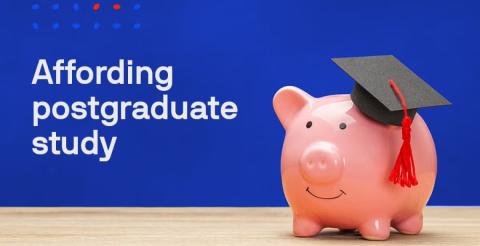What can students claim on tax in Australia?


Postgraduate study is a well-known pathway to unlocking major career benefits.
It can help you develop specialised knowledge, new skills and expanded networks, which can lead to promotions, higher income and opportunities to move into different career sectors.
However, it’s important to understand that study also comes with a range of financial obligations, including paying tuition fees and expenses, managing student loans, and completing a more complex annual tax return.
Understanding the tax implications of study is a vital part of decision-making when considering the type of course that you choose and can help you to navigate your financial responsibilities, both as a student and when paying off study loans.
Knowing the rules and regulations of student tax deductions is an important first step in making your tax return easier and reducing your tax bill.
Tax deductions for students in Australia
The Australian Taxation Office (ATO) defines study-related items that tertiary students can claim on their tax as self-education expenses.
These include the costs of undertaking courses run by educational institutions, professional bodies and industry organisations, as well as work-related conferences, seminars and self-guided study.
There are strict criteria defining which self-education expenses can be claimed on your tax return. The most important of these is that costs must be for educational activities that are directly connected to your current income-earning employment.
This means that the study taken must:
- maintain or improve skills or knowledge needed for your current employment, and/or
- increase your income (or likely income-earning potential) from this employment
The bottom line is that, in order to claim self-education expenses, you must be studying and working in a related job at the same time.
Note that if only part of your study is directly related to your current employment, such as one or more particular units in a course, you can only claim the expenses of this component.
Situations in which you cannot claim a deduction for work-related self-education expenses include:
- when your study isn’t directly connected to your current employment
- if the study is only connected in a very general way (for example, a fitness course for a construction worker)
- if you are unemployed
- if you lose the relevant job while studying (in which case you can only claim study expenses for the time you had the job)
- if the course leads to a new or different job (such as a nurse studying psychology)
What are the common expenses students can claim?
Once you’ve worked out whether the costs related to a course, unit of study or other learning activity are claimable as self-education expenses, you can start to delve into which specific expenses are tax deductible. These are divided into broad categories below.
Tuition fees
For full-fee paying students at universities and higher education institutions, tuition and course fees for studies directly connected to current employment can be claimed as a tax deduction. This includes both study that is paid upfront and via government loans schemes such as FEE-HELP and VET Student Loans (for vocational education and training).
These course fees include individual subject costs, as well as other student and amenities fees which cover non-academic support and services such as recreation, health, counselling, student clubs and employment services.
For the student loan schemes mentioned above, the full amount of tuition fees are tax deductible on the date that they are legally incurred, which is usually the census date. This means they can be claimed in the tax return relevant to that date.
Fees for conferences, seminars or employment-related courses offered by other educational providers can be claimed as tax deductions, provided they are paid for by the attendees themselves.
Tuition and course fees which cannot be claimed as tax deductions include:
- loan repayments for government study loans—both compulsory and voluntary
- tuition fees for Commonwealth Supported Places (CSPs) at universities and higher education institutions, both paid upfront and via the HECS-HELP (Higher Education Loan Program) scheme
- conference, seminar and other education expenses paid for by your employer
The following example illustrates these regulations:
- John, an experienced teacher and year-level coordinator, was recently promoted to a Deputy Principal role at his school. To improve his skills for this role, he enrols in a Master of Education as a full-fee paying student using the FEE-HELP scheme.
- John studies one unit in his first semester and incurs a $9,000 tuition fee for the unit on the census date in March. This full amount can be claimed as a tax deduction for the year in which that census date falls.
- As John’s income is above the FEE-HELP threshold, he starts making loan repayments from his first year of study. In his first year, he incurs a compulsory repayment of $540 and decides to make an additional voluntary repayment of $2,000. Neither of these amounts is tax deductible.
- John’s university charges an annual student services and amenities fee of $400. This amount is tax deductible for each year in which he makes this payment.
Study materials and tools
There are many different materials and services needed for study that can be claimed as tax deductions. Although these expenses are often small, once added together, they can have a big impact on your tax bill. Examples include:
- stationery and textbooks
- computer consumables, for example, paper and printer cartridges
- computer software and digital application fees
- student union fees
- equipment repairs, such as for laptops and technical instruments
- subscriptions to academic, trade or professional journals
There are also larger items needed for study, which can be claimed as depreciating assets. Depreciation means assigning a dollar figure to an asset’s decline in value over time, which is then divided into annual amounts to be claimed as tax deductions. This is generally for more expensive equipment owned over longer periods, including:
- computers, laptops, tablets and printers
- furniture such as desks, chairs, bookshelves, filing cabinets and desk lamps
- calculators
- technical instruments and tools
There are specific rules and methods for calculating the depreciation of relevant assets. For items worth less than $300, the full cost can usually be claimed in the year of purchase, as long as it’s only used for work-related study. If use is mixed, only the relevant portion can be claimed, such as 50 per cent of the value of a table, which is used equally for study and personal needs.
For items costing over $300, depreciation must be calculated over the effective lifespan of the asset. This can be done using the ATO’s depreciation and capital allowances tool, which uses basic information about the asset to calculate a deductible decline in value for each year of its life.
The useful lifespan of most relevant items is defined in an “effective life determinations” table—for example, two years for laptops and ten years for chairs. As above, if use of the asset is mixed between study and other purposes, only the relevant portion can be claimed.
Transport and travel expenses
Travel expenses for work-related self-education activities can be claimed as tax deductions in many cases. This includes costs for driving, parking and using public transport, and covers travel between your home, workplace and place of education.
As defined by the ATO, deductible travel expenses for study include:
- return trips between your home and place of education
- return trips between your work and place of education
- the first leg of trips from your home to your place of education and then to work
- the first leg of trips from your work to your place of education and then home
- parking fees at the education venue
Eligible public transport and parking fees are fully deductible. Car expenses for a car that you either own or lease must be calculated via the ATO’s car expenses calculator, using either the “cents per kilometer” or “logbook” method.
For example, Angela is a nurse who works in acute and emergency care in a hospital. She enrols in a Graduate Certificate in Acute Care Nursing as a full-fee paying student to improve her skills. Her weekly on-campus studies are spread out over one full day and two mornings.
For each full day of study, she drives both ways between her home and university and pays for on-campus parking. On these days, her car and parking expenses are both tax deductible. For the study mornings, she takes the train from home to university, then the bus to work at lunchtime and the bus home in the evening. On these days, only her train fares (the first leg of each journey) are tax deductible.
Online study and other deductible expenses
Other tax deductible expenses for work-related study include:
- home office running costs such as the study-related portion of internet and phone bills (excluding connection fees)
- student membership fees for relevant professional or industry organisations
- the costs of accommodation and meals for short-term study activities that require one or more nights away from home, such as conferences
- interest on loans used to pay for deductible self-education expenses, such as tuition fees or study equipment
What are the expenses students can’t claim?
In order to avoid common misconceptions about tax deductible expenses for work-related study, it’s important to fully understand the relevant guidelines.
You can get started on this by researching them on the ATO’s website, and working out your eligibility and estimated deductions using the self-education expenses calculator.
Study-related costs that cannot be claimed on your tax return include:
- tuition fees for Commonwealth Supported Places (CSPs) at universities and higher education institutions, either paid upfront or via a HECS-HELP loan
- repayments for study loans (including FEE-HELP, HECS-HELP and VET Student Loans)
- study expenses that are paid or reimbursed by an employer or other third-party
- expenses for study that is not directly connected to your current employment (for example, a course undertaken for career change or personal development)
Why is keeping records essential for successful tax claims?
In order to complete your annual tax return in a way that is straightforward, accurate and stress-free, it’s vital to keep detailed records.
There are two main reasons for this. First, good record-keeping enables you to organise your tax return and make sure all eligible deductions can be claimed. Second, while Australia’s tax system relies on self-assessment, the ATO can review your return and remove any deductions that are claimed without supporting evidence. Records are critical for resolving disputes and avoiding penalties in these cases.
Records required for study-related deductions include:
- receipts
- invoices
- bills, such as phone and internet
- logbooks, such as for car travel
- spreadsheets with information you enter throughout the year
- loan, interest and repayment documents
- study documents, such as enrolment and fee notices
- employment documents, such as contracts, payslips, timesheets and duty statements
- calculation records, such as for depreciation and other ATO calculators
Record keeping tools like the ATO’s myDeductions app can help you to stay organised for tax time throughout the year. They provide an easy and convenient way to keep all your records in one place and are highly recommended for people with multiple types of tax deductions, such as working students.
How UTS Online and FEE-HELP can support your education goals
UTS Online’s flexible postgraduate courses make it easier for busy professionals to balance work and study, and to take full advantage of the tax benefits available for tertiary students.
With 100% online delivery and a broad suite of postgraduate courses across key sectors, UTS Online enables you to choose the best study pathway that suits both your current employment and future career goals.
In 2025, UTS was ranked in the top 100 universities worldwide and the top 10 Australian universities for graduate employability. This means you’ll be investing in education to advance your career with an institution that’s globally recognised for its innovative approach, strong industry partnerships and leading academics.
FEE-HELP loans are available to cover tuition fees across the full range of UTS Online’s postgraduate courses. This enables you to confidently step into study without the worry of upfront costs and the benefit of knowing that your fees are tax deductible.
Take the next step in your education journey today. Reach out to one of our Student Enrolment Advisors for personalised guidance on study options and FEE-HELP eligibility or visit our website to learn more.





